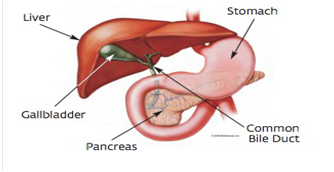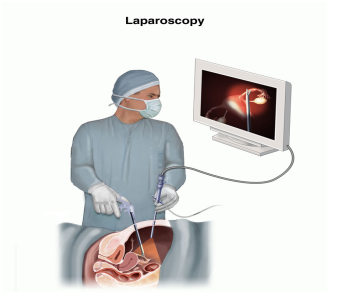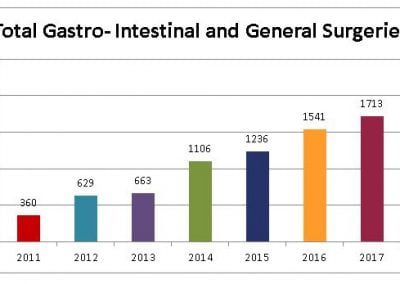Gastrointestinal Surgeries at Marengo Asia CIMS Hospital: A Leader in GI Care in Ahmedabad
Marengo Asia CIMS Hospital in Ahmedabad, India, stands as a premier healthcare institution, renowned for its expertise in a broad range of medical specialties, including Gastrointestinal (GI) surgeries. The hospital’s commitment to offering cutting-edge surgical procedures, backed by a team of experienced surgeons and state-of-the-art technology, makes it a top destination for patients with complex gastrointestinal disorders.
Understanding Gastrointestinal Surgeries
Gastrointestinal (GI) surgeries involve the treatment of diseases affecting the digestive tract, which includes the esophagus, stomach, liver, pancreas, small intestine, colon, and rectum. Conditions treated by GI surgeons range from benign disorders like gallstones and hernias to complex conditions such as cancers, inflammatory bowel disease (IBD), and chronic liver diseases.
Why Choose Marengo Asia CIMS Hospital for GI Surgeries?
Marengo Asia CIMS Hospital is a recognized leader in providing advanced GI surgical care. Here’s why patients trust CIMS Hospital for gastrointestinal surgeries:
1. Expert GI Surgeons
CIMS boasts a team of highly skilled and internationally trained gastrointestinal and colorectal surgeons who specialize in a wide range of GI surgeries. These surgeons have extensive experience in both open and minimally invasive techniques, ensuring patients receive the most effective treatment for their specific condition.
2. State-of-the-Art Surgical Technology
The hospital is equipped with the latest surgical technologies, including advanced laparoscopic and robotic-assisted surgery systems. Minimally invasive techniques offer patients numerous benefits, including smaller incisions, reduced pain, quicker recovery times, and shorter hospital stays. The use of robotics in GI surgeries provides unparalleled precision, making it ideal for complex procedures.
3. Comprehensive GI Care
Marengo Asia CIMS Hospital offers comprehensive care, ensuring patients receive all necessary treatments and follow-up in one place. The hospital’s multidisciplinary approach brings together GI surgeons, gastroenterologists, oncologists, radiologists, and dieticians to create personalized treatment plans tailored to each patient’s needs.
4. Wide Range of GI Surgeries
CIMS Hospital performs a variety of gastrointestinal surgeries, addressing both common and complex conditions:
- Laparoscopic Cholecystectomy: Removal of the gallbladder, typically performed to treat gallstones and gallbladder disease.
- Appendectomy: Removal of the appendix, often due to appendicitis.
- Hernia Repair Surgery: Repair of inguinal, umbilical, and other types of hernias using both open and laparoscopic techniques.
- Colorectal Surgery: Procedures to treat conditions such as colorectal cancer, diverticulitis, and inflammatory bowel disease (IBD), including Crohn’s disease and ulcerative colitis.
- Bariatric (Weight Loss) Surgery: For patients suffering from obesity, CIMS offers procedures like gastric bypass and sleeve gastrectomy, which aid in significant weight reduction and management of related health conditions like diabetes.
- Pancreatic Surgery: Removal or drainage of the pancreas to treat pancreatitis, tumors, or cysts.
- Liver Surgery: Liver resections to remove cancerous tumors or treat conditions such as liver cirrhosis and bile duct obstruction.
- Gastroesophageal Reflux Disease (GERD) Surgery: Surgical intervention for severe GERD, including fundoplication, which helps prevent acid reflux.
- Esophageal Surgery: Treatments for conditions such as esophageal cancer or achalasia.
- GI Cancer Surgery: CIMS offers specialized surgeries for cancers of the stomach, pancreas, liver, colon, and rectum, with an emphasis on both curative and palliative care.
5. Focus on Minimally Invasive Surgeries
The GI surgeons at CIMS Hospital prioritize minimally invasive techniques such as laparoscopic and robotic-assisted surgery whenever possible. These approaches offer several benefits:
- Smaller incisions, leading to less post-operative pain.
- Reduced risk of infection and fewer complications.
- Faster recovery times, allowing patients to return to daily activities sooner.
- Improved cosmetic outcomes due to smaller scars.
6. Specialized Care for GI Cancers
Gastrointestinal cancers, including those of the stomach, pancreas, colon, and liver, require highly specialized care. At Marengo Asia CIMS Hospital, the GI surgical oncology team works closely with medical oncologists and radiotherapists to provide comprehensive cancer care. Using advanced imaging and diagnostic techniques, surgeons can accurately stage the cancer and plan the most effective surgical intervention, often combined with chemotherapy or radiation.
7. Advanced Diagnostic and Pre-Surgical Planning
CIMS Hospital is equipped with cutting-edge diagnostic tools such as high-resolution endoscopy, colonoscopy, CT scans, MRI, and PET scans, which help in the early diagnosis and precise treatment planning for GI conditions. Pre-surgical evaluations also ensure that every patient is in optimal health before undergoing any procedure.
Recovery and Post-Surgical Care
Post-operative care is a critical aspect of recovery, and Marengo Asia CIMS Hospital excels in this area. The hospital’s experienced nursing staff and rehabilitation team ensure that patients receive round-the-clock care and guidance throughout their recovery. Pain management, dietary adjustments, and physical therapy are integrated into the post-surgical process to promote healing and reduce complications.
For cancer patients, post-surgical treatment may include follow-up care with oncologists, chemotherapy, or radiation therapy, ensuring a holistic approach to cancer management.
Patient-Centered Care
One of the key strengths of Marengo Asia CIMS Hospital is its focus on patient-centered care. From diagnosis to surgery and recovery, patients are actively involved in decisions about their treatment options. The hospital’s team provides education about the procedure, expected outcomes, and lifestyle modifications, helping patients make informed choices.
The hospital’s commitment to delivering compassionate care is reflected in its emphasis on communication, comfort, and the emotional well-being of patients and their families during their treatment journey.
International Standards and Accreditation
Marengo Asia CIMS Hospital is accredited by NABH (National Accreditation Board for Hospitals & Healthcare Providers), guaranteeing that the surgical and healthcare protocols meet international standards of quality and safety. The hospital is also a favored destination for international patients seeking world-class GI care in India, thanks to its excellent outcomes and affordable treatment options.
Marengo Asia CIMS Hospital in Ahmedabad is a leader in gastrointestinal surgeries, offering expert care and advanced surgical treatments for a variety of GI conditions. Whether it’s a routine procedure like a hernia repair or a complex surgery for GI cancer, patients at CIMS receive the highest quality care. With its blend of skilled surgeons, innovative technologies, and patient-focused approach, CIMS Hospital continues to set new benchmarks for excellence in GI surgery.
For more information on gastrointestinal surgeries or to schedule a consultation, visit Marengo Asia CIMS Hospital’s official website or contact their GI department directly.
Gastrointestinal Surgeries are those surgeries related to digestion or gastrointestinal system. The digestive system is an intricate system which can be disturbed by food bacteria, any disease or any kind of stress. Some digestive problems need to be treated with medicines, lifestyle/ habit changes or surgeries.
The Surgical Gastroenterologist specializes in the gastrointestinal tract diseases related to esophageal, stomach, small and large intestine, liver, pancreas and gall bladder.
Ultrasound and Endoscopy are diagnostic tools. Nowadays, the technology gives the patient minimal pain with fast recovery with Laparoscopic Surgery also known asKeyhole Surgery. This surgical process includes small incision in the abdominal wall and doing surgery through small incisions for quick and easy recovery. The patients may get discharged much early and recovers faster compared to open surgery.

- Upper GI Clinic deals with the disease of the Esophagus (Food pipe), Stomach and Duodenum.
Conditions affecting the Esophagus (Food pipe):
- Esophageal diverticulum
- Corrosive (acid) ingestion injuries and strictures
- Achalasia cardia and other motility disorders
- Gastresophgeal Reflux Disease (GERD)
- Hiatus hernia
- Esophageal cancer
Conditions affecting the Stomach and Duodenum:
- Peptic ulcer disease and its complications
- Gastrointestinal Stromal Tumors (GIST)
- Stomach cancer
- Colorectal Clinic deals with conditions of the colon and rectum requiring special expertise and care.
Conditions affecting Colon and Rectum
- Ulcerative colitis
- Crohn’s disease
- Rectal prolapse
- Colonic diverticulitis
- Colonic cancer
- Rectal cancer
- Perianal diseases
- Hepatobiliary and Pancreas Clinic deals with the disease of the liver, gall bladder and pancreas. The diseases of these organs are complex and require a dedicated and expert team to give the best possible treatment.
Conditions affecting the Liver:
- Liver Cancer (HCC)
- Bile duct cancer (Cholangiocarcinoma)
- Metastatic colorectal cancer
- Neuroendocrine tumors
- Other metastatic tumors
- Benign liver lesions
Conditions affecting the pancreas include:
- Pancreatic cancer
- Pancreatitis
- Pseudocyst
- Cystic tumors
Conditions affecting the bile ducts and gallbladder include:
- Gallstones
- Biliary stricture
- Bile leaks (caused by trauma and surgery)
- Cancer (cholangiocarcinoma/gallbladder)
Who is a surgical gastroenterologist?
A surgical gastroenterologist is a surgeon who specializes in the gastrointestinal tract (including the esophagus, stomach, small intestine, and large intestine) and other digestive organs (liver, pancreas, bile ducts, and gall bladder).
When should one visit a surgical gastroenterologist?
- Pain in abdomen, vomiting, frequent loose stools with blood, blood in stools.
- Some symptoms like difficulty in swallowing, blood in vomitus, jaundice with itching, weight loss and loss of hunger could be early signs of cancer.
- Often stones in gall bladder or liver cancer may not show symptoms and are recognized on routine health checkup.
Does a surgical gastroenterologist treat cancer?
Yes, a surgical gastroenterologist is a specialized cancer surgeon who operates on cancer of the gastrointestinal tract.
What is laparoscopic surgery (Keyhole surgery)?
Laparoscopy is examination of the interior of the abdomen by means of a camera called a laparoscope. Laparoscopic surgery is a method by which surgery is performed through small incisions in the abdominal wall and inserting the instruments through specially designed ports.
Can Cancer be treated successfully through laparoscopic surgery?
Yes, recent studies have shown that laparoscopic surgery is superior to open in terms of cancer cure.
What are the benefits of laparoscopic surgery?
- Minimal pain
- Fast recovery
- Scarless surgery
How long do I have to stay in hospital?
Following laparoscopic surgery for gallstones or hernia they can be discharged on the same day. For the advanced procedures for Gastrointestinal Cancers, longer stay is required depending on the surgery being done.

When can I get back to work?
Usually a week’s rest from the day of surgery should be sufficient. But it would be advisable for the surgeon to advice based on your progress.
Do I have to take absolute bed rest?
No, you can become ambulant as early as pain and anaesthetic factors permit.

STATISTICS

Contact Us
Toll Free Number : 1800 309 9999
Medical Helpline +91 70 69 00 00 00
Phone: 079 4805 1200 or 1008
+91 79 2771 2771 or 72
Ambulance: +91 98244 50000
Email: info@cims.org | opd.rec@marengoasia.com | marengocims.info@marengoasia.com
Location
Marengo Asia Healthcare Private Limited
CIN Number - U85100GJ2020PTC131504
Plot No. 67/1, Opp. Panchamrut Bunglows, Nr. Shukan Mall, Off Science City Road, Sola, Ahmedabad – 380 060
In case of any patient safety or quality-of-care related concern, please contact to JCI by clicking here.

 Subscribe to our channel
Subscribe to our channel
